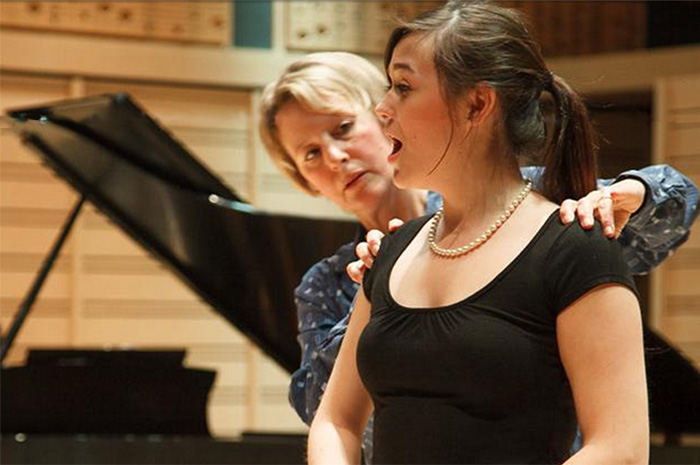The Deep End of the Pool

Associate Professor of Music Lynn Helding works with music major Holly Kelly '15. Photo by Carl Socolow '77.
Vocalists dive deep to distinguish science from myth
by MaryAlice Bitts-Jackson
If you took voice lessons, sang in a choir or took part in a musical, you’ve been advised to “sing from your diaphragm.” Or maybe you were warned that if you didn’t sing in the classical style, you’d “ruin your voice.”
These are widespread beliefs. But, says Associate Professor of Music Lynn Helding, they’re entirely subjective. In the classroom and as head of a new organization devoted to the scientific study of voice, she works to distinguish vocalization fact from myth.
Helding is a co-founder and the chief operating officer of the Pan-American Vocology Association (PAVA), the first nonprofit dedicated to the emerging field. Legally incorporated on July 8, PAVA offers symposia and online educational opportunities for voice professionals, clinicians and researchers, applying the scientific method to better understand, teach and practice the art.
“What we’re doing is providing a baseline of objective, scientific information about how the physiology and acoustics [of vocalization] work,” Helding says, explaining that the traditional European master-apprentice system of voice pedagogy is instead rooted in musical conventions and an individual’s aesthetic judgment. Vocology also departs from the medical model, which focuses on pathology, rather than on the processes of vocalization and of building and strengthening the voice to meet specific goals.
An expert in the field, Helding earned a vocology certificate from the National Center for Voice and Speech, and she performs funded research on neurological voice disorders and rehabilitative therapies. Her column “Mindful Voice” appears bimonthly in Journal of Singing, the official publication of the National Association of Teachers of Singing. She’s also a mezzo-soprano who has performed internationally and has taught music at Dickinson since 1993.
In recent years, Helding has used cutting-edge equipment to analyze student voices at Dickinson, and she teaches an innovative Vocal Technique class that combines instruction in physiology, acoustics and vocal training. The course is offered to music and non-music majors alike and is an approved elective for Dickinson’s health-studies certificate program. Past students have gone on to pursue careers in speech pathology as well as vocal performance.
“These students are learning the latest in vocal science,” Helding says, adding that most undergraduate voice instruction comes in the form of private lessons or ensemble singing and that the “very small pool” of voice-science instruction is primarily found only in graduate and highly specialized programs. “So this [course] is a unique opportunity for students on this campus who love to sing and who want to dig a bit deeper.”
Similar opportunities are on the horizon for professionals across the Americas and Europe, as PAVA leadership is gearing up to provide certification in the field. “We believe the demand for establishing a codified set of standards and scope of practice in voice therapy and training is strong at the national level,” Helding says.
Learn more
Published October 8, 2014